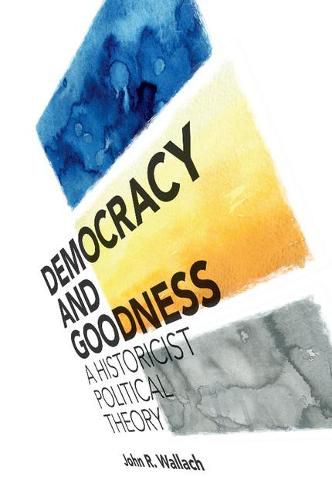Readings Newsletter
Become a Readings Member to make your shopping experience even easier.
Sign in or sign up for free!
You’re not far away from qualifying for FREE standard shipping within Australia
You’ve qualified for FREE standard shipping within Australia
The cart is loading…






Citizens, political leaders, and scholars invoke the term ‘democracy’ to describe present-day states without grasping its roots or prospects in theory or practice. This book clarifies the political discourse about democracy by identifying that its primary focus is human activity, not consent. It points out how democracy is neither self-legitimating nor self-justifying and so requires critical, ethical discourse to address its ongoing problems, such as inequality and exclusion. Wallach pinpoints how democracy has historically depended on notions of goodness to ratify its power. The book analyses pivotal concepts of democratic ethics such as ‘virtue’, ‘representation’, ‘civil rightness’, ‘legitimacy’, and ‘human rights’ and looks at them as practical versions of goodness that have adapted democracy to new constellations of power in history. Wallach notes how democratic ethics should never be reduced to power or moral ideals. Historical understanding needs to come first to highlight the potentials and prospects of democratic citizenship.
$9.00 standard shipping within Australia
FREE standard shipping within Australia for orders over $100.00
Express & International shipping calculated at checkout
Citizens, political leaders, and scholars invoke the term ‘democracy’ to describe present-day states without grasping its roots or prospects in theory or practice. This book clarifies the political discourse about democracy by identifying that its primary focus is human activity, not consent. It points out how democracy is neither self-legitimating nor self-justifying and so requires critical, ethical discourse to address its ongoing problems, such as inequality and exclusion. Wallach pinpoints how democracy has historically depended on notions of goodness to ratify its power. The book analyses pivotal concepts of democratic ethics such as ‘virtue’, ‘representation’, ‘civil rightness’, ‘legitimacy’, and ‘human rights’ and looks at them as practical versions of goodness that have adapted democracy to new constellations of power in history. Wallach notes how democratic ethics should never be reduced to power or moral ideals. Historical understanding needs to come first to highlight the potentials and prospects of democratic citizenship.